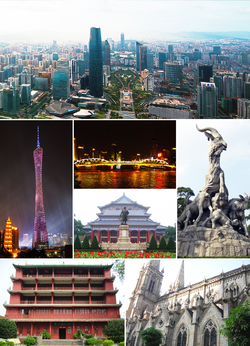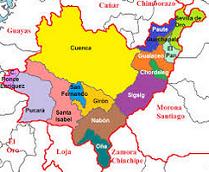
noun
- a small territorial district, especially one of the states of the Swiss confederation.
- (in a department of France) a division of an arrondissement.
- Heraldry. a square area in the dexter chief, or right-hand corner, of an escutcheon, often distinctively treated: a diminutive of the dexter chief quarter.
- Architecture. a pilaster or similar feature projecting from the corner of a building.
- Obsolete. a division, part, or portion of anything.
verb (used with object)
- to divide into parts or portions.
- to divide into cantons or territorial districts.
- to allot quarters to (soldiers, troops, etc.).
noun
- Also called Kwangchow, Guangzhou, Kuangchou. Older Spelling. a seaport in and the capital of Guangdong province, in SE China, on the Zhu Jiang.
- a city in NE Ohio: location of the football Hall of Fame.
- a city in E Massachusetts.
- a city in W central Illinois.
- a town in central Mississippi.
noun Pinyin.
- a province in SE China. 89,344 sq. mi. (231,401 sq. km). Capital: Canton.
noun (ˈkæntɒn, kænˈtɒn)
- any of the 23 political divisions of Switzerland
- a subdivision of a French arrondissement
- (ˈkæntən) heraldry a small square or oblong charge on a shield, usually in the top left corner
verb
- (kænˈtɒn) (tr) to divide into cantons
- (kənˈtuːn) (esp formerly) to allocate accommodation to (military personnel)
noun
- (kænˈtɒn) a port in SE China, capital of Guangdong province, on the Zhu Jiang (Pearl River): the first Chinese port open to European trade. Pop: 3 881 000 (2005 est)Chinese names: Guangzhou, Kwangchow
- (ˈkæntən) a city in the US, in NE Ohio. Pop: 80 806 (2000)
noun
- a province of SE China, on the South China Sea: includes the Leizhou Peninsula, with densely populated river valleys; traditionally also including Macao and Hong Kong; the only true tropical climate in China. Capital: Canton. Pop: 79 540 000 (2003 est). Area: 197 100 sq km (76 100 sq miles)
1530s, “corner, angle,” from Middle French canton “piece, portion of a country” (13c.), from Italian (Lombard dialect) cantone “region,” especially in the mountains, augmentative of Latin canto “section of a country,” literally “corner” (see cant (n.2)). Originally in English a term in heraldry and flag descriptions; applied to the sovereign states of the Swiss republic from 1610s. Related: Cantoned.
 Liberal Dictionary English Dictionary
Liberal Dictionary English Dictionary


